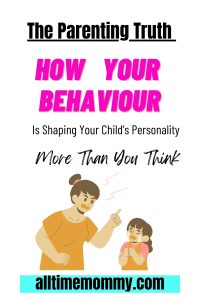It happened on a Tuesday evening.
My eight-year-old had just shouted at his little brother for borrowing his pencil without asking.
The tone, the impatience, even the exact words — it all felt uncomfortably familiar.
And then it hit me: he sounded just like… me.
That moment stayed in my mind for days. Was his behaviour just “kids being kids,” or was it something he had learned from watching me?
Seeking answers, I reached out to Dr. Lydia Mwangi, a child psychologist with over 15 years of experience helping families navigate behaviour issues.
She didn’t sugarcoat it.
Many of the behaviours we see in our children are mirrors, reflecting the environment they grow up in.
Take anger, for example. Dr. Lydia explained, “When a child gets angry quickly, one possible reason is they haven’t been praised enough. Children crave recognition. If they don’t get it for their good behaviour, they might resort to anger to get noticed.” That made me rethink how often I rush past my child’s small achievements without acknowledging them.
Then there’s rudeness. According to Dr. Lydia, “Children are not born rude. They learn it. And often, the first examples come from parents, guardians, or other adults close to them.” It’s a confronting truth. Our tone of voice, choice of words, and even our sighs of impatience can be absorbed and replayed by our children.
One point that really stayed with me was about empathy. If a child doesn’t respect others’ feelings, Dr. Lydia said it might be because they haven’t experienced much respect for their own emotions at home. “When you constantly order a child around without considering their feelings, you send a message: emotions don’t matter. And if theirs don’t matter, why should anyone else’s?”
But our conversation didn’t stop there. Dr. Lydia gave me more examples that hit even closer to home.
If you buy your child everything they need but still find them taking things that don’t belong to them, it might be because you never give them the freedom to choose for themselves. Sometimes, ownership is as much about choice as it is about possession.
If your child never stands up for themselves, it could be linked to how you discipline them. “When parents scold or punish a child in public — especially in front of their friends — it chips away at their confidence,” Dr. Lydia warned. What feels like “teaching a lesson” can actually teach a child to stay silent.
Jealousy, too, often has roots in our words. If you constantly compare your child to others, they may begin to see life as a competition, always measuring themselves against someone else.
And what about children who seem overly fearful or hesitant? Sometimes it’s because we step in too quickly to help. “If you remove every obstacle from a child’s path,” Dr. Lydia said, “they never learn how to overcome challenges on their own.”
If your child intentionally disturbs you when you’re working or relaxing, it could be their way of telling you, without words, that you’re not truly present. You might be in the same room, but they can feel when your mind — and heart — are somewhere else.
Finally, lying. Dr. Lydia explained that a child who lies often may have learned to do so because of how we react to their mistakes. If our responses in the past have been harsh or overreactive, they may start hiding the truth to avoid punishment.
By the end of our conversation, I realised this wasn’t about pointing fingers at parents. It was about awareness. Children live what they learn. If we want them to be respectful, confident, and honest, we must create an environment that models those traits.
Dr. Lydia’s final words stayed with me:
“Parenting is not just about teaching right from wrong. It’s about being the example of the right you want your child to follow.”
Related:
7 Critical Ways Your Parenting Style Affects The Future of Your Child
Parents Who Raise Great Leaders and Not Followers Usually Teach These 8 Unique Things
It’s not just anecdotal. Yes.
What Dr. Lydia shared isn’t just her personal opinion . Decades of research in child development psychology back it up. For instance, children often mirror how parents manage their emotions.
Calm parents typically raise calmer children.
Children learn how to handle their emotions by watching the adults around them. If they see you staying calm in stressful situations, they begin to understand that problems can be solved without shouting, slamming doors, or sulking. But if they regularly see anger, impatience, or emotional outbursts, they may copy that behaviour, believing it’s a normal way to respond.
Researchers have also found that the strength of your emotional connection with your child — known as ‘secure attachment’ — plays a big role in their confidence.
Children who feel emotionally safe and supported are more willing to try new things, take healthy risks, and step outside their comfort zone.
On the other hand, children who don’t feel this emotional safety can become overly cautious or fearful of making mistakes.
Discipline is another key area.
Harsh or inconsistent discipline — especially when it’s done in front of others — has been linked to increased aggression and defiance.
The reason?
Public humiliation damages self-worth and can make a child feel they have to fight back, either with words or actions.
Then there’s over-involvement.
When we rush in to solve every problem for our children, even the small ones, we unintentionally teach them that they can’t cope without us.
Over time, this can weaken their problem-solving skills and make them more dependent than they need to be.
Finally, comparisons .
Whether to siblings, classmates, or friends — can do more harm than good.
Studies show that repeated comparisons can chip away at self-esteem and fuel jealousy, making it harder for children to celebrate others’ successes or feel content with their own progress.


